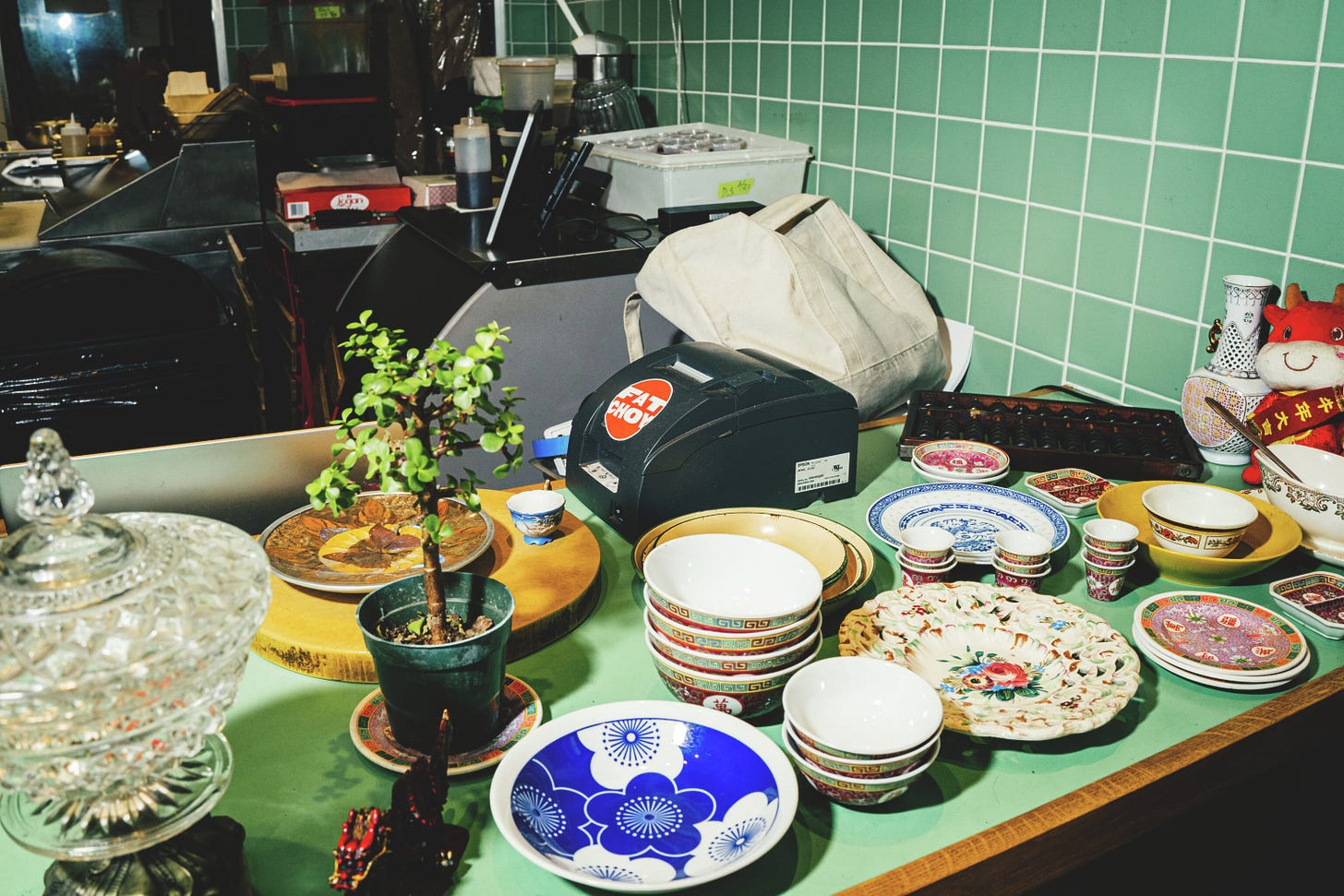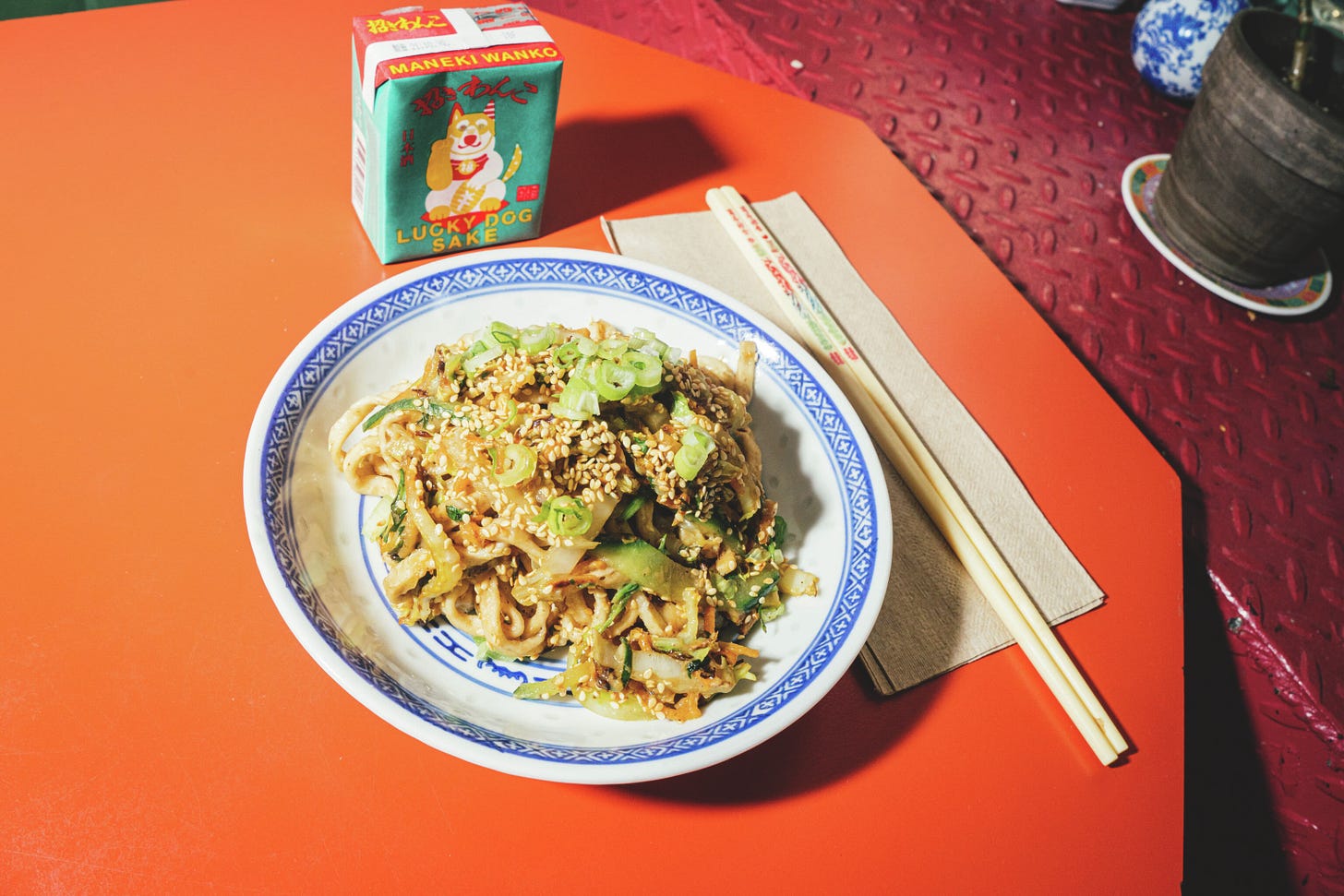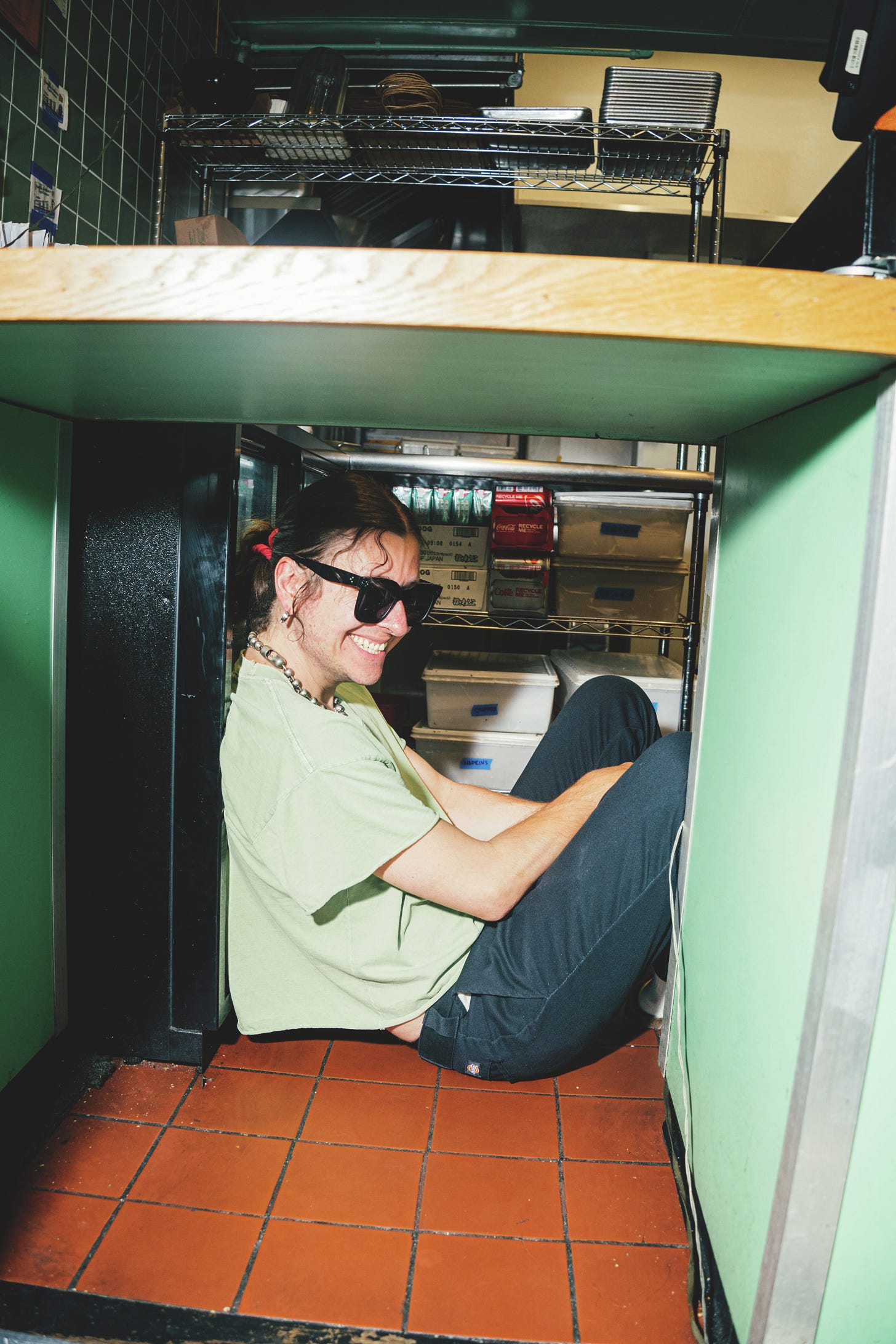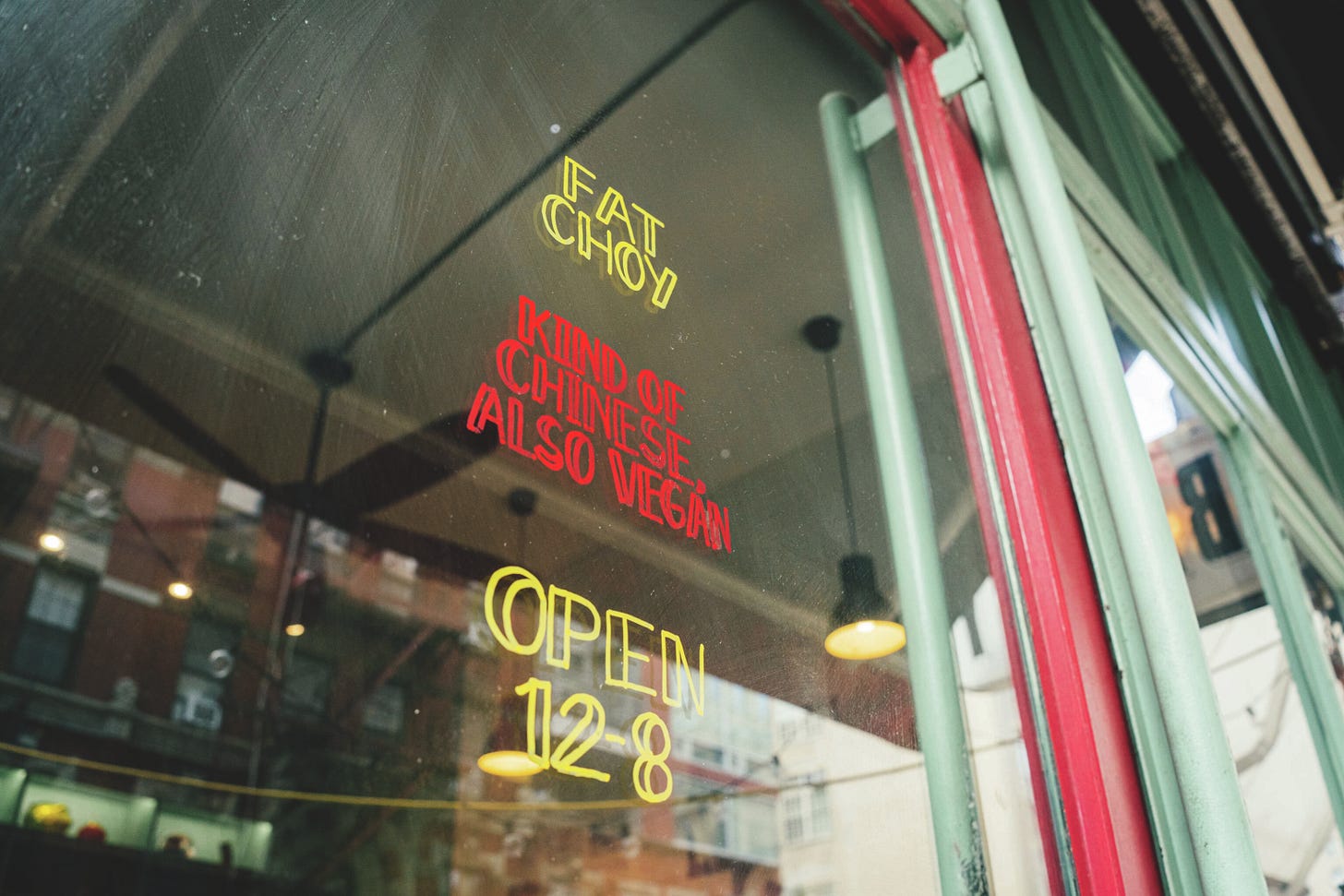This piece is adapted from the forthcoming book, Made Here: Recipes and Reflections from NYC's Asian Communities, by the non-profit, Send Chinatown Love.
Our self-published book is available now.
The potential irony of an avid meat eater owning and operating a vegan restaurant is not lost on Justin Lee. A veteran of New York City’s fine dining gauntlet, Justin was chef-owner of Fat Choy in Manhattan’s Lower East Side. He kept his omnivore status balanced via his restaurant’s manifesto, “kind of Chinese, also vegan,” best delivered with a shrug. “If I feed 100 people a day, or 600 people a day, I can go and eat an entire standing rib roast and tell everyone to fuck off because I fed that many people vegetables,” Justin unapologetically stated. “If we care about the planet and are not trying to be better than the person next to us, how do we get from being holier-than-thou to being like, ‘How do we get everyone to eat some vegetables every now and then?’”

From its fanfare-filled yet trepidatious opening in September 2020 to its unexpected shuttering in December 2022, Fat Choy established itself as an approachable neighborhood restaurant, collecting accolades via non-traditional and delicious vegan Chinese food without taking itself too seriously. A distinct lack of pretense permeated the spartan restaurant, a small counter-serve space sandwiched between a smoke shop and a bakery on the increasingly-trendy Broome Street. Hand-drawn flyers from past menu specials adorned the walls as you made your way to the register in full view of the compact kitchen. If you were lucky, Justin’s wife Katie would be the first person you’d interact with by the register, walking you through the playfully illustrated, school-lunch-style menu. Chinese porcelain dinnerware, once belonging to Justin’s grandfather, was displayed by the register, an homage to his family’s restaurant background. A jovial Budai laughed in the direction of patrons, belly out for good luck rubs. Above the pass, shelves hosted a family of waving neko cats, Chinese lion puppets, and other Chinatown gift shop bric-a-brac. It was playful. It was unabashed. It was a proud confluence of Chef Justin’s Chinese and American identities.

The name Fat Choy was inspired by the colloquial Cantonese greeting for New Year’s (恭喜發財, or gong hei fat choy), where fat choy means “prosper/get rich”. The homonym choy (菜) also evokes the spirit of Justin’s mission: “I think of choy as synonymous with all the green vegetables,” he said. “Whether it’s yu choy, ong choy, aa choy, bok choy… it’s choy. So it means green vegetable to me. And since we’re a fast food joint, we want to make you fat with our vegetables. And it sounds good. You can say it however you want.” In true Chinese American fashion, the business was an amalgam of traditional and modern sensibilities, an overabundance of prosperity through produce. And prosper it did. Fat Choy was named one of Esquire’s Best New Restaurants in 2021, just over a year after opening—their ever-popular “mushroom sloppy”, a griddled house-made sesame pancake oozing shroom “ragu”, appeared all dressed up in its brown wrapping paper, putting its best foot forward alongside its peers’ tweezered plating and dishes dressed in gold leaf.
Justin, who grew up in Northern Virginia, spent his childhood visiting family several hours away in Manhattan’s Chinatown. “We came to New York every weekend when I was a kid just to eat food. This is the food that I love,” he said, “My maternal grandfather owned a restaurant called Bill Hong’s, where Mike Tyson, Sugar Ray Leonard, and LL Cool J would go and eat Chinese food in Midtown. My paternal grandparents owned a bakery on Mott Street. Food has always been a part of my culture or my upbringing.” However, Justin began his journey not as a student of the culinary arts, but as a student of law. It wasn’t until a trip to Las Vegas to celebrate his brother’s own graduation from law school, that Justin realized that he might not follow in those same footsteps. “I was talking with my brother’s friend, and he was like, ‘Justin, what are you doing taking the LSATs? You just set up all of these Michelin-star dinners for us to go to. Why don’t you just go to culinary school? What are you afraid of?’ That was the realization that led me to cook.” He opted to forgo the law school admissions test in favor of a stint at the Culinary Institute of America. His time there fostered connections that would jumpstart his culinary career, including an offhand conversation with a mentor that put him on a fast track to the top of New York City’s culinary scene.
“Brendan Walsh was credited for bringing American Southwest food that was chic to New York,” said Justin. “That was my skills teacher, the guy I learned how to cook stocks with and cut anything in whatever size.” As he neared his culinary externship, he told Chef Brendan about his dream of working in a Michelin-Starred restaurant, rattling off a list of places, including Veritas, a New American restaurant in the Flatiron District. Brendan stopped him right there—his friend and former employee helmed Veritas. It had originally opened in 1999, with chef Scott Bryan at its helm, whom the late Anthony Bourdain referred to as “a cult figure among cooks.” “Chef Walsh told Scott I was a hard worker. I’m not talented but I’ll make up for it in pure effort,” laughed Justin. “I came down to the city and I worked for Scott. He didn’t pay me. But I didn’t go back to CIA.” Thus began his journey through the labyrinthian New York City restaurant scene. “New York opens the door and it gives you an amount of leeway to earn your spot, depending on what they say about you. It’s the best thing about the industry, New York or otherwise—you have to prove it.” Years later, he’s proven it, with stints at culinary institutions such as Barbuto, Locanda Verde, and Montmartre, leaving behind fillets, chops, and cheese, having settled into his groove on a bed of vegetables.

Even at the helm of a vegan restaurant, Justin still maintained a complex relationship with veganism as a cultural movement. Veganism’s roots are steeped in ancient tradition, tracing back to early Indian and eastern Mediterranean societies, although abstaining from animal-based foods also spans indigenous, Buddhist, and African cultures, to name just a few. The term “vegan” was coined only in 1944 by a British animal rights activist, and in modern America, the practice takes many a lifestyle form: from a punk rock/anti-industrial agriculture approach to an of-the-moment “clean-eating” focus. “It’s funny because I think that like all of those [American] archetypes of veganism are what I didn’t subscribe to,” Justin admitted. “Fat Choy is the idea that you don’t have to care about veganism to eat good food. That you can still want to eat more vegetables than you ate yesterday.” His approach made for an open, accepting, non-judgmental space to be vegan for a meal, without the expectation of lifelong commitment to an ideal. Rather than chastising a customer for their diet, his cooking simply suggested to an eater that vegetables can make for a satisfying, delicious meal, sans animal products. “The more that we can allow people to do that instead of judging them for their choices outside of Fat Choy, the more they can eat at Fat Choy or any other vegan place.”

That’s not to say, however, that Justin was cooking without a mission of his own. His profound knowledge of the detrimental impact of industrial agri-business and factory-farmed animals on both the environment and our diets informed both the operations of his restaurant and his cooking. Vegetable scraps were given new life as stock or upcycled into another dish. Most other waste was sent to compost—as closed-loop as one can get in a city currently without widespread sustainability infrastructure. Fat Choy sourced mindfully, picking what looked good each day from local vendors. Many other vegetarian and vegan institutions in Chinatown host meat substitutes on their menus, but Justin forwent all that, opting instead to make vegetables the star of the show. “I don’t have any issue with seitan or tempeh, those ancient Buddhist foods, because they make sense to me. I just don’t cook with that stuff because I’ve been cooking since 2008 and have never cooked with those ingredients. I’ve cooked with vegetables from Chinatown, and vegetables from Union Square Greenmarket, become friends with those people and highlighted their ingredients,” he said. “More recently, I’m finding that mock meats are like us chasing this high that we’ll never achieve. I don’t think we can keep comparing vegan food to steaks, and seafood, and ever expect to move the needle.”
Since it first opened, Fat Choy had been a hotspot for the denizens and visitors of the Lower East Side. But Justin was getting tired of cool neighborhoods. Fat Choy’s opening location fell within a proving ground for food, trendy or otherwise, among natural wine bars and art galleries beneath renovated tenement housing in an ever-changing lower Manhattan. This first coming of the restaurant was good for exposure and publicity in circles that had already largely accepted vegan food as a lifestyle choice. But to better serve his mission of changing hearts and minds, Justin dreamed of taking his business to a place where a single vegan meal would go a longer way. “We, as a niche brand, [shouldn’t] be in a cool neighborhood. Sure, we can make a special first coming of Fat Choy there. But where we’re going to win is Midtown, Rockefeller Center, and maybe FiDi,” he said. “These super high volume places—we have to move there where there’s a captive audience (the best way to say it), where there are only three vegan options and this one is the Asian one.” The thinking was, that by setting up shop where office workers dine out for two or three of their daily meals, Justin may very well “capture a carnivore,” and show them that one vegan meal is a very easily achievable, delicious, and repeatable feat.

These expansion plans wouldn’t come to fruition—Fat Choy closed its doors on December 23rd, 2022. Business had slowed over time, and the restaurant’s small check averages and inflation all played a part in the eventual closing; they simply weren’t making enough money. Keeping dishes affordable and accessible was foundational to Justin’s ethos, but when prices for staple ingredients rose to unsustainable levels, he knew it was time to hang up the apron. “The writing had been on the wall,” Justin explained. On their last day in operation, regulars and first-time patrons alike paid their respects to the mushroom sloppy and got in one last order of sticky rice dumplings before the whole menu would be 86’d. Written, literally, on the wall was a hand-drawn, multicolor string of letters that cheekily proclaimed, “It was ok while it lasted.” Gloom was nowhere to be found—the mood was light, and service went on as usual. Justin helmed the line on his own, a full-circle flashback to when Fat Choy first opened, as the boys in the prep kitchen belowdecks cleared out the walk-in. It also happened to be Justin’s birthday—bubbles and shots, from bottles gifted by visiting friends, were poured liberally for the staff and anyone who happened to be dining at the time. This convergence—customers, friends, and staff alike enjoying one last taste of Fat Choy—epitomized the business as it was: a comfortable gathering place for good-for-the-Earth food and good people. “Katie and I honestly couldn’t be prouder of the team or happier about our accomplishments and future,” said Justin.
In the two years that Justin held court on Broome Street, he made a lasting mark on the principles and appetites of this city, doling out dish after dish that even non-vegans would queue for. “You didn’t miss eating a steak, you can do this every now and then! If people did this once a month, or once a quarter, what a change! What a change we would see. It’s still less than every day of your life.” On his mission to show people that Chinese and vegan food can be vastly different from what they’ve experienced before, Justin further proved that each meal you eat could be an opportunity to ultimately make a choice for the better. “That’s what food is. You eat every day of your life.”
For Fat Choy’s recipe for Vegetable Longevity Noodles, plus 40+ more stories like this one, order your copy of Made Here today - preorders close on August 5th.

A Quick Addendum
Justin had no intention of reopening Fat Choy - Chef was planning on syncing schedules with Katie, who is a schoolteacher, by pursuing a new career track as a gym teacher (from feeding the world vegetables to bolstering the physical health of our youth - what a guy!). Not to mention, getting off the line would simply allow them more time together; having off holidays and weekends would be a welcome change after so much time spent running restaurants.
However, on June 5th, 2023, Fat Choy announced its return to the world, only this time in Englewood, New Jersey, after accepting a business opportunity to reopen the restaurant with the hospitality entrepreneur Jonathan Krieger. The new spot will boast an expanded menu (Kung Pao hashbrowns anyone?), and likely more seating than the late Lower East Side location, with hopefully the same unpretentiousness that made Fat Choy such a chill place to hang out and eat your veggies.
Gym teacher plans are on hold for now. Everybody go send Justin this GIF as congratulations.
Fat Choy, forever!



